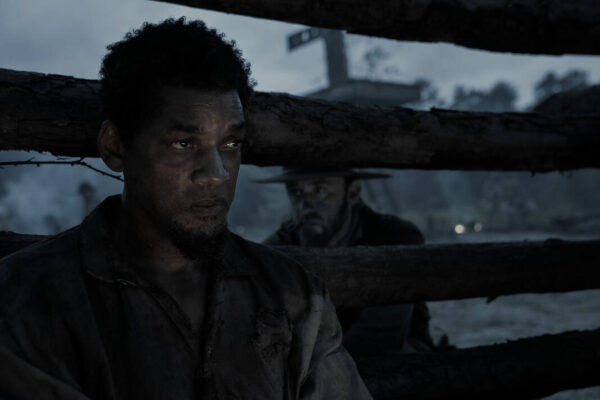
Opening in select theaters last week before its Friday streaming premiere on Apple TV+, “Emancipation” is rated R for violence, and for “disturbing images and language.”
Those words also apply to the Will Smith Oscar night incident eight months ago. So. With that out of the way, we can get into Smith’s first post-slap film release, a large, ambitious and, on the surface, seriously intentioned picture about the horrors of slavery amid the Civil War.
Underneath the surface? “Emancipation” lands perilously close to a gamer’s fantasy of enslavement, escape, superheroics and rousing, righteous vengeance, based a tiny bit on the historical record. In other words, director Antoine Fuqua’s film is far closer to the spirit and the pile-driving action beats of Mel Gibson’s “Apocalypto” than to Steve McQueen’s superb “12 Years a Slave.”
That latter Oscar winner has been derided in some quarters as both too genteel and too difficult to watch. Few are likely to feel the same way about “Emancipation.” For all the institutional and inhuman cruelty and viscera on view, it’s too propulsive to be a tough sit; it’s essentially a straight-up chase movie, fraudulent but fleet. Smith’s real-life character, a Haitian-born cotton plantation slave, reassures us at every step that he will be fine, and he will vanquish many foes along the way. And as a bonus, according to “Emancipation,” the Civil War turned out the way it did because of one man’s God-blessed instincts for survival.
Fuqua and company filmed “Emancipation” in the summer of 2021. Screenwriter Bill Collage’s story is inspired by a single, momentous photograph, one of the most consequential in American history. In 1863, an escaped slave known either as Gordon or Peter (accounts vary) enlisted in the Union Army fighting in Baton Rouge, Louisiana.
During a medical examination, Peter bared his back to reveal a horrific display of bullwhip lacerations and scars, both ordinary and extraordinary in their savagery. Harper’s Weekly published the resulting photograph of “Whipped Peter” and the image traveled widely, becoming instrumental in helping Northern abolitionists make their case against slavery and in favor of President Abraham Lincoln’s Emancipation Proclamation, from two months earlier.
In “Emancipation,” the fictionalized Peter is first seen on the plantation, leading his wife (Charmaine Bingwa) and children in prayer. “Trust in Him,” Peter says. With that, “Emancipation” conjures an invisible sphere of safety around its Christlike protagonist.
At the movie’s half-hour mark, after a numbing depiction of murder, mutilation and bodies of slaves dumped into lime pits, Peter, taken from his family to a railroad work site, escapes with three other slaves. They brave the swamps — always good for jump scares involving alligators or snakes — and run for their lives, eventually splitting up. Primarily “Emancipation” pits Peter against the wily hunter Fassel (Ben Foster, portraying a convincingly casual sadist), who comes equipped with bloodhounds as well as an ever-present drone camera overhead.
Fuqua, whose earlier films include “Training Day,” the “Equalizer” franchise and “The Magnificent Seven” remake, likes to change things up visually, to the point where the style of the filmmaking is strictly a momentary thing. Likewise, cinematographer Robert Richardson toggles between silvery black-and-white, sepia tones and then sepia flecked with splashes of color, a la the girl in the red coat in “Schindler’s List”: orange for flames, green for comforting images of grass and trees, murky red for close-ups of wounds and the flags of both the North and South.
In chase-movie terms, the film gets the job done. When screenwriter Collage leaps into fantasy land for a big finish, allowing Peter to quite literally win the war, audiences may well go with it.
I couldn’t. The hooey factor gets to be too much, and it treats the indelible impact of the photo that inspired “Emancipation” as a convenient hook for its inventions. The scenes of the photography session itself are sharp, well-handled and chillingly calm — an apt ending to the story. And then the story goes on to give us a rousing climax that not even the filmmakers seem to believe.
Smith and Foster, taking on the only fully dramatized or even characterized people on screen, are very good, and both actors have the skills to suggest unimaginable horrors, inflicted or survived, without even speaking. “Things past tellin’”: In three words, one of the survivors of the slave trade, quoted in the seminal 1988 oral history “Bullwhip Days,” described our legacy of slavery. America’s still fighting like hell over how we deal with it: forget it, sanitize it or remember it and teach it so we don’t repeat its worst lessons in some other form.
That’s why the real Peter’s photograph changed things; it didn’t need words, just eyes and a conscience. “Emancipation” is never dull, but it’s rarely without its box office instincts for falsification front and center, alongside its star. And while it has been built on the scarred back of a real man, the movie is too busy with the business of entertainment to focus on the “real” part for long.
‘EMANCIPATION’
2 stars (out of 4)
MPAA rating: R (for strong racial violence, disturbing images and language)
Running time: 2:12
How to watch: Now in select theaters; on Apple TV+ Friday
